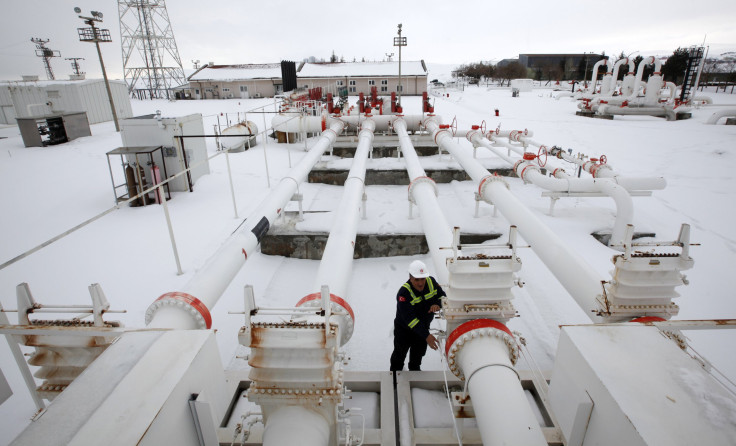Europe Looks To Turkey For Gas Bypassing Russia, Ukraine

ISTANBUL -- Turkish energy officials are talking to resource-rich nations in Central Asia about creating an energy partnership that would funnel gas to Europe via a pipeline bypassing Russia. At diplomatic meetings and energy conferences throughout the Middle East, Europe and Asia, Turkish officials are promoting their country as a stable, reliable energy conduit in the region -- the only one that can provide energy security in a turbulent part of the world.
The government is making the case that Turkey is best positioned, both geographically and politically, to find a solution to Europe’s energy conundrum -- namely, that the Ukrainian crisis has Europeans wary of depending on Moscow for energy.
“There is a clear program of dependence on Russian gas, which is a problem now because of the situation in Ukraine," said Marco Giuli, an expert on energy at the European Policy Center, a think tank based in Brussels. “European policymakers have been trying to find a more diverse gas supplier since the ’90s, but right now there is more intense momentum for that to happen. To Eastern Europe especially, it’s absolutely critical.”
Natural gas and oil to the northeast of Turkey, in the Caspian Sea basin and beyond, constitute about 65 percent of the world’s total known reserves; 65 percent of the world’s consumption of oil and gas happens to the west of Turkey. That geographical accident, combined with a democratically elected government and rising regional clout, is leading Turkey into a role as a reliable energy pathway that sidesteps active war zones to its north and south.
“Turkey should be able to aggregate different sources of natural gas with diversification away from Russia,” said Sinan Ülgen, an expert on Turkish foreign policy at Carnegie Europe, a research institute in Brussels. “It would be a game changer because Turkey would become a much bigger importer of natural gas.”
Turkey is currently proceeding with two major oil and gas projects that have the potential to deliver natural gas from Azerbaijan to Europe, the Southern Gas Corridor and the Trans-Anatolian pipeline.
The $45 billion Southern Gas Corridor project “is one of the most significant projects for the supply of natural gas to European Union countries," Turkish Energy Minister Taner Yıldız said during a meeting last month. Stretching 3,500 kilometers (2,000 miles) across seven nations from Azerbaijan’s Shah Deniz Stage 2 field on the Caspian Sea, the corridor will carry natural gas through Turkish territory into Greece and then into Albania and Italy.
A key element of the corridor is the 2,000-kilometer (1,200-mile), $11 billion Trans-Anatolian pipeline, which will cross the entire length of Turkey's Asian landmass. The pipeline will begin at the Georgia-Turkey border and pass through Anatolia, as Turkey's Asian part is known, to Greece. It will not be completed until 2019.
The European Union has stated a goal of ultimately importing up to 120 billion cubic meters of natural gas per year from the Caspian Sea. A significant portion would pass through Turkey. Those imports could become a viable alternative to much of Russia's exports to the EU: In 2013, according to statistics from Russian gas monopoly Gazprom, Russia exported 127 billion cubic meters of natural gas to Western Europe.
But Europe’s plan to significantly reduce its reliance on Russian energy will require looking beyond Azerbaijan, which "can only provide in the short term,” Giuli said.
That’s why Turkish energy officials this week met with the government of Turkmenistan, which holds the world's fourth-largest natural gas reserves.
"Turkmenistan lies in a key location to connect Central Asia to international markets over the Caspian Sea," Turkish President Recep Tayyip Erdoğan said during a press conference on Tuesday.
Following a meeting with Turkmen President Gurbanguly Berdimuhamedow in Ankara this week, Erdoğan announced that Turkmenistan, Turkey and Azerbaijan have sealed an energy partnership that will allow them to deliver Azerbaijani and Turkmen gas from the Hazar Basin to European countries via Turkey.
The announcement comes after months of talks, brokered by Turkey, between Azerbaijan and Turkmenistan.
"Until now there hasn't been an agreement between Turkmenistan and Azerbaijan about linking supplies," Ülgen said.
That pact has been signed. In November, Turkey and Turkmenistan agreed that Turkmenistan will supply gas to the Trans-Anatolian pipeline, by laying its own pipeline across the Caspian Sea and linking to the Azerbaijani infrastructure.
But some analysts say they are unsure whether the energy partnership among Turkey, Turkmenistan and Azerbaijan will last.
"It's still too early to figure out whether Turkmenistan can commit to such a project," Giuli said. "The political relationships between Turkmenistan and Azerbaijan have not been good. There are still significant problems in terms of settling waters in the Caspian."
If Turkey proves itself a successful negotiator and delivers natural gas to Europe, it could use its performance as an intermediary to attract investment into its own energy sector.
"Turkey doesn't yet have the capacity to become a major energy hub," said Luay al-Khatteeb, an expert on energy in the region and senior adviser to the Federal Parliament of Iraq for energy policy and economic reform. "It still needs to acquire the resources."
It has begun building them. The so-called right-of-way, or the strip of land where the Trans-Anatolian pipeline will be laid, will be cleared in just a few days; work is expected to finish on March 15. The pipeline's capacity is expected to achieve 16 billion cubic meters of natural gas per year. Six billion cubic meters of natural gas will be delivered to Turkey, the rest to Europe.
© Copyright IBTimes 2024. All rights reserved.





















